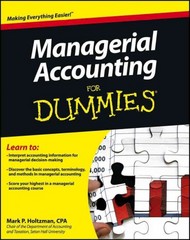Question
MASTERING CORPORATE GOVERNANCE: WHEN EARNINGS MANAGEMENT BECOMES COOKING THE BOOKS There is often a blurred line between appropriate and inappropriate accounting techniques, but the audit
MASTERING CORPORATE GOVERNANCE: WHEN EARNINGS MANAGEMENT BECOMES COOKING THE BOOKS There is often a blurred line between appropriate and inappropriate accounting techniques, but the audit committee must attempt to clearly distinguish which is which. The guiding principle of the audit committee is shifting from a focus on technical accounting procedures to determining whether disclosures in the financial reports present a true and fair view of the entity's affairs. Companies often face a great deal of pressure to meet the earnings forecasts they present to investors and analysts, or the estimates these analysts make. Executives of companies in this situation often resort to using a range of 'earnings management' techniques to help them 'make the numbers'. These techniques will often exploit loopholes in generally accepted accounting principles (GAAP) to manipulate the company's income. It is up to the audit committee members to identify whether earnings management, accounting -estimates and other judgements are legitimate or are designed to blur the true financial position of the company. Source: Adapted from Ira Millstein, 'When earnings management becomes cooking the books', The Financial Times.83
QUESTIONS
1. What earnings management techniques are outlined in the above article?
2. What role can the audit committee play in detecting and/or limiting earnings management?
3. What relationship does the audit committee have with the external auditors in ensuring earnings management is within acceptable limits?
4. Evidence shows that earnings management has often been a practiced for a considerable period of time. Motivation for this practice is driven by management wishing to achieve outcomes that are favourable to them and or favourable to the entity. Outline the five methods that entities can use to manage earnings. Discuss the circumstances in which entities are likely to use each method. For each method provide a relevant example.
(Rankin, 7/2017, p. 280) Rankin, M., Ferlauto, K., McGowan, S., Stanton, P. (7/2017). Contemporary issues in accounting 2nd edition, 2nd Edition [VitalSource Bookshelf version]. Retrieved from vbk://9780730343530
Step by Step Solution
There are 3 Steps involved in it
Step: 1

Get Instant Access to Expert-Tailored Solutions
See step-by-step solutions with expert insights and AI powered tools for academic success
Step: 2

Step: 3

Ace Your Homework with AI
Get the answers you need in no time with our AI-driven, step-by-step assistance
Get Started


